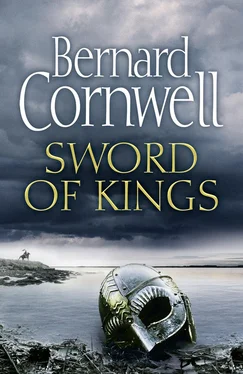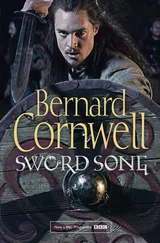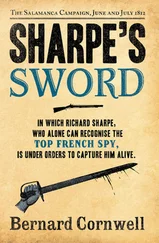Banamaðr was indeed turning. I saw her sail come down, saw the late morning light reflected from oar-blades as they were thrust outboard. Saw the long oars dip and pull, and saw Banamaðr labouring westwards as if seeking the safety of a Northumbrian harbour.
So the bloodfeud, it seemed, had come to me.
I had liked Æthelhelm the Elder. He had been Wessex’s richest ealdorman, a lord of many estates, a genial and even a generous man, and yet he had died as my enemy and as my prisoner.
I had not killed him. I had taken him prisoner when he fought against me, then treated him with the honour that his rank deserved. But then he had caught a sweating sickness, and though we had bled him, though we had paid our Christian priests to pray for him, and though we had wrapped him in pelts and given him the herbs that women had said might cure him, he had died. His son, Æthelhelm the Younger, spread the lie that I had killed his father, and he swore to take revenge. He swore a bloodfeud against me.
Yet I had thought of Æthelhelm the Elder as a friend before his eldest daughter married King Edward of Wessex and gave the king a son. That son, Æthelhelm’s grandson, Ælfweard, became the ætheling. Crown Prince Ælfweard! He was a petulant and spoiled child who had grown to be a sour, sullen and selfish young man, cruel and vain. Yet Ælfweard was not Edward’s eldest son, that was Æthelstan, and Æthelstan was also my friend.
So why was Æthelstan not the ætheling? Because Æthelhelm spread the rumour, a false rumour, that Æthelstan was a bastard, that Edward had never married his mother. So Æthelstan was exiled to Mercia, where I had met him and where I came to admire the boy. He grew into a warrior, a man of justice, and the only fault I could find in him was his passionate adherence to his Christian god.
And now Edward was sick. Men knew he must die soon. And when he died there would be a struggle between the supporters of Æthelhelm the Younger, who wanted Ælfweard on the throne, and those who knew that Æthelstan would make the better king. Wessex and Mercia, joined in an uncertain union, would be torn apart by battle. And so Æthelstan had asked me to swear an oath. That on King Edward’s death I would kill Æthelhelm and so destroy his power over the nobles who must meet in the Witan to confirm the new king.
And that was why I would need go to Wessex, where my enemies were numerous.
Because I had sworn an oath.
And I had no doubt that Æthelhelm had sent the ships north to weaken me, to distract me, and, with any luck, to kill me.
The four ships appeared in the summer haze. They were wallowing in the summer sea, but as we appeared they hoisted their sails and turned to pursue us.
Banamaðr had dropped her sail so that, as she pretended to flee westwards, the four ships would not see the black eagle that now faced aft. And we, the moment we saw Banamaðr turn, also dropped our sail so that the enemy would not see the wolf’s head of Bebbanburg.
‘Now row!’ Finan called to the benches. ‘Row!’
The summer haze was thinning. I could see the distant sails bellying in the gusting wind and could see they were gaining on Egil, who was only using three oarsmen on each side. To show more oars was to betray that his ship was no merchant’s vessel, but a serpent-ship crammed with men. I wondered for a moment whether I should follow his example, then decided that the four distant ships were unlikely to fear a single warship. They outnumbered us, and I did not doubt that these men had been sent to kill me if they had the chance.
So I would give them the chance.
But would they take it? More urgently, they were gaining on Banamaðr , driven fast by the brisk wind, and I decided to reveal myself, shouting at my crew to hoist the big sail again. The sight of the wolf’s head might give the enemy pause, but surely they must reckon on winning the coming fight, even against Uhtredærwe.
The sail flapped as it rose, boomed in the wind, then was sheeted home, and Spearhafoc leaned into the sea as her speed increased. The oars were brought inboard and the oarsmen pulled on their mail coats and fetched their shields and weapons. ‘Rest while you can!’ I called to them.
The sea was white-flecked now, the crests of the waves being blown to spume. Spearhafoc was dipping her bow, drenching the deck, then rising, before plunging down into the next roller. The steering-oar was heavy in my hands, needing all my strength to push or pull as it quivered with speed. I was still sailing south to face the four ships, to challenge them, and Egil now did the same. Two ships against four.
‘You think those are Æthelhelm’s ships?’ Finan asked.
‘Who else?’
‘He won’t be on any of them,’ Finan grunted.
I laughed at that. ‘He’s safe home in Wiltunscir. He hired these bastards.’
The bastards were in a line now, spread across our path. Three of the ships looked to be about the size of Spearhafoc , while the fourth, which was furthest east, was smaller, no bigger than Banamaðr . That ship, seeing us race southwards, was lagging as if reluctant to join a fight. We were still far away, but it seemed to me that the smaller ship had very few crewmen.
Unlike the three larger ships, which kept coming towards us. ‘They’re well manned,’ Finan said calmly.
‘Egil’s Scotsman said there were about forty men in the ship that stopped him.’
‘I’d guess more.’
‘We’ll find out.’
‘And they have archers.’
‘They do?’
‘I can see them.’
‘We have shields,’ I said, ‘and archers like a steady ship, not a boat pitching like an unbroken colt.’
Roric, my servant, brought me my helmet. Not the proud helmet with the silver wolf crouching on its crest, but a serviceable helm that had belonged to my father and was always left on board Spearhafoc . The metal cheek-pieces had rusted and been replaced with boiled leather. I pulled the helmet over my head and Roric laced the cheek-pieces so that an enemy would see nothing but my eyes.
Three of the ships bore no symbols on their sails, though the craft furthest west, closest to the unseen Northumbrian coast, showed a coiled snake, which, like our wolf, was probably woven from wool. The huge slab of cloth was reinforced with rope that made a diamond pattern through which the black snake showed. I could see the water shattering white at her bow.
Egil had turned Banamaðr so, instead of feigning a clumsy flight west towards the harbours of the Northumbrian coast, he was now sailing south next to Spearhafoc . Like me he had hoisted his sail, his crew just sheeting it home as we came abreast of him. I cupped my hands and shouted across the churning water. ‘I’m aiming for the second one!’ I pointed to the ship nearest the snake-sailed vessel. Egil nodded to show he had heard. ‘But I’m going to attack the snake one!’ I pointed again. ‘You too!’
‘Me too!’ he called back. He was grinning, his fair hair streaming from beneath his helmet’s rim.
The enemy had spread into a line so that any two of their ships could close on one of ours. If that notion had worked they could board us from both sides at once and the sword-work would be brief, bitter, and bloody. I let them think that plan would succeed by heading slightly off the wind towards the second ship from the west and saw the other two larger ships slightly change their direction so that they were headed towards the place where they thought we would meet their line. They were still spread out, at least four or five ships’ lengths between each, but their line was shrinking. The smaller ship, slower than the others, lagged further behind.
Читать дальше












